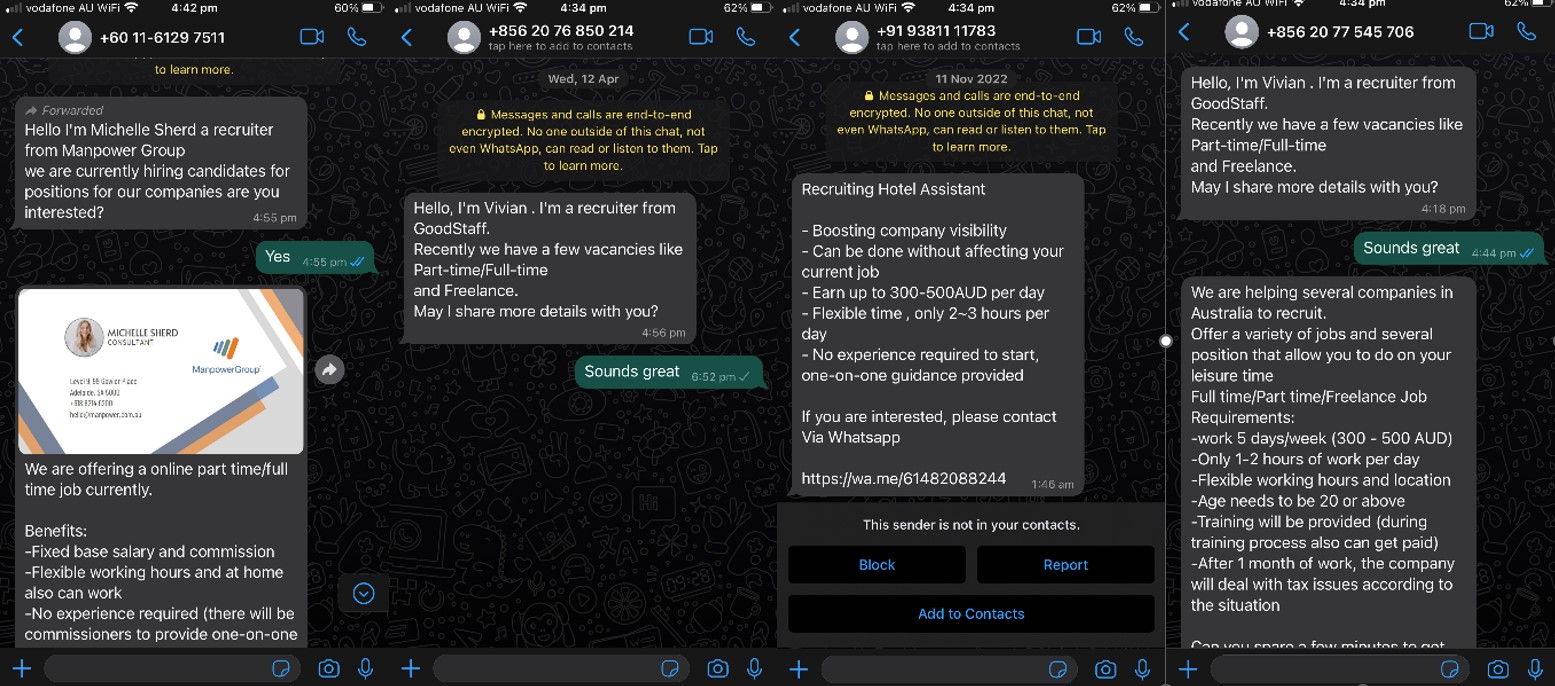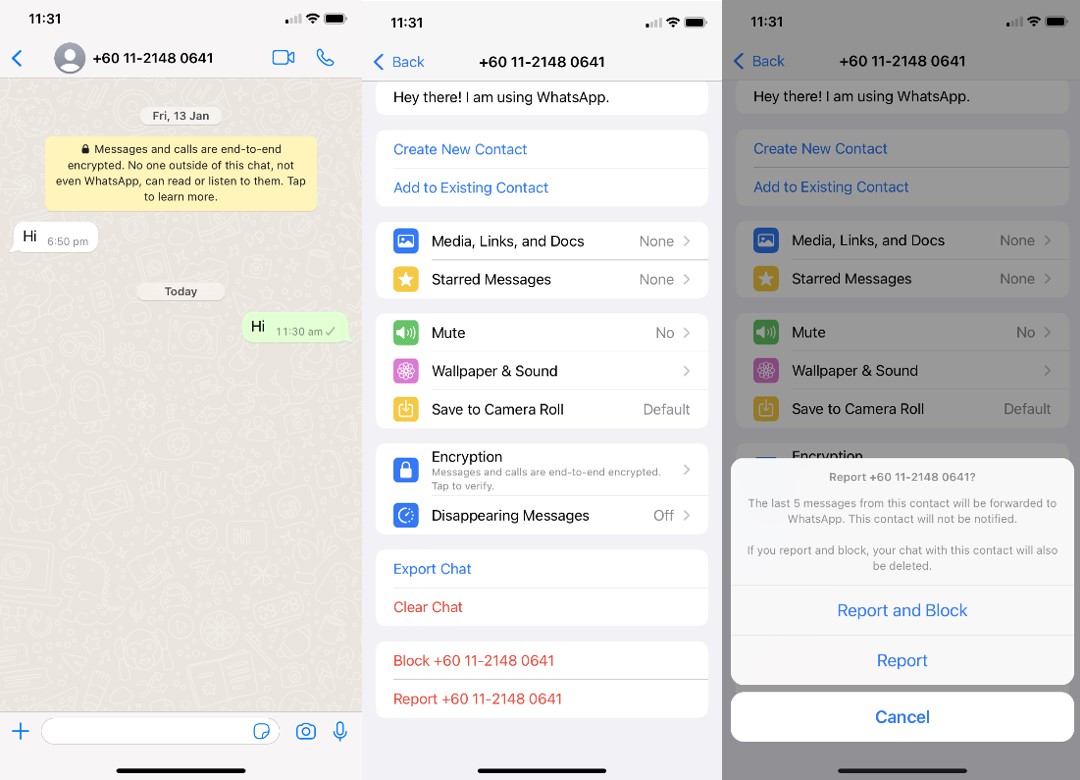Job Scams on WhatsApp: How to Spot and Avoid Them in Australia
In today’s digital age, online platforms have become popular tools for job seekers to connect with potential employers. WhatsApp, a widely used messaging app, has also emerged as a platform where individuals search for job opportunities and engage in professional conversations. However, with the increasing reliance on technology, scammers have found ways to exploit unsuspecting job seekers through WhatsApp. This article aims to shed light on common job scams taking place with the use of WhatsApp in Australia and provide tips on how to spot and avoid them.
Understanding Job Scams on WhatsApp
Job scams on WhatsApp involve fraudulent individuals posing as recruiters or employers and targeting job seekers on the messaging platform. These scammers employ various tactics to trick victims into providing personal information, making financial transactions, or falling for false promises. By understanding the common characteristics and red flags of job scams, you can stay one step ahead and safeguard yourself.
Red Flags to Watch Out For
Grammar in Job Descriptions
In the past, job scammers were often identified through their poor grammar in job descriptions. However, with the advent of artificial intelligence (AI), scammers have evolved their tactics and now create more convincing job scams with well-written descriptions.
Despite this improvement, it remains crucial to exercise caution when evaluating job opportunities. Legitimate job postings typically feature professionally crafted descriptions that adhere to proper grammar, consistent formatting, and clearly outline job requirements. Therefore, encountering job postings riddled with grammatical errors, inconsistent formatting, or a lack of clear job requirements should still raise suspicions, as these may signal a potential scam.
Requests for Personal Information Upfront
Be cautious if a recruiter or employer asks for personal information such as your social security number, bank account details, or copies of identification documents right at the beginning of the conversation. Legitimate recruiters typically request such information only after an initial screening or offer has been made.
Promises of High Pay for Minimal Effort
If a job offer promises unusually high compensation for minimal work or requires no specific skills or qualifications, it’s likely too good to be true. Scammers often use this tactic to lure unsuspecting job seekers into their trap.
Salary Claims followed by AUD (Australian dollars)
Scammers often try to make their scams appear more legitimate and appealing by providing specific details, including the salary, to attract potential victims. For example, they may mention a specific salary in AUD to make the job offer seem more credible and enticing, especially for individuals seeking employment in Australia. However, it’s important to note that the presence of a salary figure, regardless of the currency mentioned, does not guarantee the authenticity of the job opportunity.
Lack of Official Company Information
Legitimate companies have a professional online presence with a website, social media profiles, and contact information. If the supposed employer cannot provide a verifiable website or any official company details, it raises suspicions about their authenticity.
Pressure to Make Quick Decisions
Scammers create a sense of urgency to pressure job seekers into making rash decisions. They may claim that the position is in high demand or that immediate action is needed to secure the job. Legitimate employers understand the importance of allowing candidates to carefully consider their options.
Common Job Scams in Australia
Payment Request Scam
One prevalent scam involves scammers asking for payment from job seekers under the guise of processing fees, visa charges, or administrative costs. It’s important to note that legitimate employers do not ask candidates to pay for job opportunities. Be wary of any requests for money, especially if they seem unrelated to typical hiring processes.
Identity Theft Scam
Another alarming scam is identity theft, where scammers request personal identification documents, such as passports or driving licenses, claiming they need them for verification purposes. Sharing personal information puts you at risk of identity theft. Genuine employers typically request identification documents later in the hiring process, not during initial conversations.
Fake Job Offers Scam
Scammers create deceptive job offers to lure unsuspecting job seekers into providing personal and financial information. These scammers may employ sophisticated tactics, such as crafting convincing employment contracts or impersonating well-known companies. It’s crucial to conduct thorough research and verify the authenticity of any job offers received through WhatsApp.
Work-from-Home Scam
With the rising popularity of remote work, scammers exploit this trend by offering enticing work-from-home opportunities that turn out to be scams. They may promise high pay for easy tasks but ultimately trick victims into making financial transactions or sharing personal information. Exercise caution when considering work-from-home offers and verify the legitimacy of the employer before proceeding.
Pyramid Scheme Scam
Some scammers disguise pyramid schemes as legitimate job opportunities. They may claim that you can earn significant income by recruiting others into the scheme. Remember, genuine jobs focus on your skills and qualifications rather than relying on recruitment incentives. Be wary of any job offers that heavily emphasize recruitment efforts.
How to Protect Yourself from Job Scams
Thoroughly Research the Company
Before engaging in any conversation or sharing personal information, thoroughly research the company. Look for a legitimate website, online reviews, and verify the contact information provided. Genuine companies will have a professional online presence, including an official website and credible social media accounts.
Exercise Caution with Unsolicited Job Offers
If you receive a job offer out of the blue without applying or going through an interview process, exercise caution. Genuine employers typically follow a structured hiring process and don’t randomly provide job offers to candidates without prior interaction. Take the time to investigate the company and assess the legitimacy of the offer before proceeding.
Guard Your Personal Information
Avoid sharing sensitive personal information upfront, especially if you haven’t verified the legitimacy of the employer. Legitimate recruiters will typically request personal information during the later stages of the hiring process. Be cautious of any requests for personal information.
Beware of Payment Requests
Legitimate employers never ask candidates to pay for job opportunities. If you encounter a WhatsApp conversation where the other party requests payment for processing fees, visa charges, or administrative costs, it is likely a scam. Do not share any financial information or make any payments. Instead, report the incident to the relevant authorities or platforms to help prevent others from falling victim to the scam.
Trust Your Instincts and Be Cautious of Urgency and Pressure Tactics
If something feels too good to be true or raises suspicions, trust your instincts. Scammers often use urgency and pressure tactics to manipulate job seekers. They may create a sense of urgency by claiming that the opportunity is limited or that you need to act quickly to secure the position. Be wary of such tactics and take your time, ask questions, and assess the situation objectively. If the offer or communication seems suspicious, it’s better to err on the side of caution and disengage from the conversation. Legitimate employers understand the importance of making informed decisions and will provide you with ample time to consider the opportunity.
Verify Job Offers Independently
If you receive a job offer through WhatsApp, independently verify its authenticity. Reach out to the company directly using official contact information obtained from their website or trusted sources. Confirm if the offer is genuine and inquire about the person you have been communicating with on WhatsApp. Legitimate employers will appreciate your diligence in confirming the legitimacy of the job offer.
Reporting Job Scams
Finally, if you encounter a job scam on WhatsApp, it’s essential to take appropriate actions to protect yourself and others from falling victim. Here are some steps you can take:
Most messaging platforms and job boards have mechanisms in place to report fraudulent activity. Use these reporting features to alert the platform administrators about the scam. Include all relevant details and screenshots as evidence.
If you believe you have been a victim of a scam, it is important to report this information to the bank, financial institutions or other relevant agencies immediately.
All suspected scams regarding Adecco Australia can be reported to us directly through our Report a Scam form.
Reporting scams directly on WhatsApp:
- Tap on the phone number in the conversation to visit the chat information screen.
- Scroll down to the bottom of this screen to find the report option and tap to report.
- WhatsApp will advise that the last 5 messages from this contact will be sent to WhatsApp. This will help them evaluate the scam messages, investigate and take action.
Job scams through WhatsApp can be financially and emotionally devastating for job seekers. It is important to note that, you should never be asked to provide personal identification such as your bank details, passport, tax file number, license, Medicare, or any other sensitive information. By understanding the red flags, exercising caution with unsolicited offers, researching thoroughly, and taking necessary precautions, you can spot and avoid these scams.
Remember to trust your instincts, conduct due diligence, and report any fraudulent activity to protect yourself and others in the job market.
Disclaimer: The information provided in this article is for general information purposes only. All information is provided in good faith however, Adecco makes no representation or warranty of any kind, express or implied, regarding the accuracy, adequacy or completeness of any of the information and its intent is to generally advice and raise awareness.













